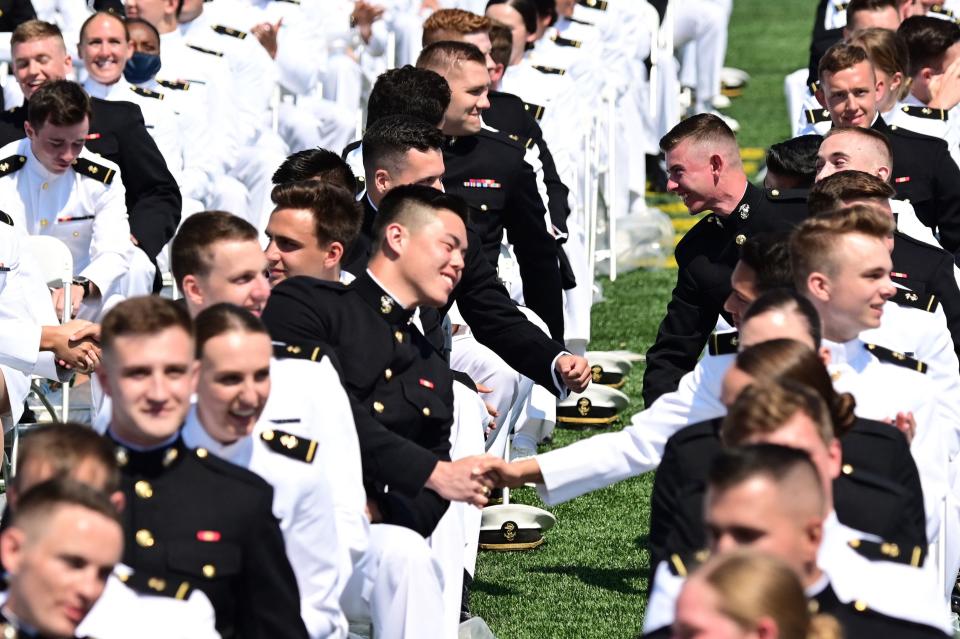Don't eliminate affirmative action for military academies | Opinion
Earlier this year, in a historic decision, the Supreme Court severely limited, if not effectively ended, the use of affirmative action in college admissions.
By a vote of 6-3, the justices ruled that the admissions programs used by the University of North Carolina and Harvard College violate the Constitution’s equal protection clause, which bars racial discrimination by government entities.
This decision did not affect the admission processes of the U.S. service academies (U.S. Air Force Academy, U.S. Naval Academy, U.S. Military Academy, U.S. Coast Guard and U.S. Maritime Academy) because these institutions were not included in the lower court case.
There has now been an effort put forth to change this omission and include the service academies.
Our government’s decision in 1961 to create affirmative action hits close to me. I was a young man looking to go to college in the south. The federal government’s decision was a crucial step to changing attitudes, policies and cultures in the United States, especially in the South. But it was only a step. At that time, there were no Blacks attending Auburn University, The Citadel or University of Alabama. There was no requirement for schools to be race-conscious in their student population.
At the time, schools and uinversities could discriminate against qualified non-white students. Which is one of the reasons, I ended up attending Tuskegee University (then Tuskegee Institute) a HBCU (Historically Black College and University). When I graduated from Tuskegee, I went straight to Vietnam.
As a young, inexperienced 24-year-old 1st Lieutenant, I was the only Black officer on Bien Hoa Air Base. I was on every race relation council that existed on the Base. I was it, no back up and no senior Black officers that I could confide in. Twenty-five percent of our enlisted force stationed in Vietnam were Black, with only 2% of Black officers. I was one of them. There was obviously no affirmative action for the draft.
More: Retired Air Force colonel, businessman Herman Cole wins Titusville City Council seat
Presently our military is comprised of 9% Black officers. Today our military academies reflect our population ratio, about 12.5%. Throughout my 26-year military career (June 1968-June 1994) I was either the only Black officer on the base or the highest-ranking Black officer on the base.
Conservatives on the court have long attacked affirmative action in college admissions as undercutting merit, a way in for unqualified students of color to gain admission, which is not true. Their argument then was, why would the justices uphold affirmative action anywhere; it's like either the Constitution prohibits the use of race in college admissions, or it doesn't.
Why are we going backwards?
It feels like it shouldn't matter if a student of color is trying to graduate as an engineer, a teacher, or a military officer. The Department of Defense makes that exact case during oral arguments before the court. I know from hard experience that when we do not have a diverse officer corps, that is broadly reflective of a diverse fighting force, our strength and cohesion and military readiness suffer. So, it is a critical national security imperative to attain diversity within the officer corps. At present it's not possible to achieve that diversity without race-conscious admissions including at our nation's service academies.

It is imperative that our academies maintain a diverse population reflective of our nation. The disproportionate number of Black Military officers during the Vietnam conflict presented a definite problem during that era. I experienced it.
The military decided it needed to make sure there were more Black commanders and Black officers across the board to achieve equity. That's why so many former military leaders made the argument to the Supreme Court that affirmative action and diversity in the military was a “battlefield issue."
More: Laws affecting health care for the LGBTQ community force change at local SPEKTRUM office
Affirmative action is not just about black Americans, but part of its focus was to help start a chapter of opportunity and inclusiveness for all ethnicities. The military has always led society in forward thinking; the desegregation of the military was six years (1948) ahead of the Supreme Court decisions to desegregate public education and 16 years ahead of the Civil Rights Act of 1964.
Our service academies represent the best of our nation, those who are willing to step forward and make the call at a young age to support and defend this country. A diverse community and fighting force are part of the recipe for a successful military and despite the ruling by the Supreme Court, we as a nation must continue to thrive and grow together.
Herman A. Cole Jr. Colonel, USAF (retired) is the president/founder of the Humanity Task Force.
This article originally appeared on Florida Today: Don't eliminate affirmative action for military academies

